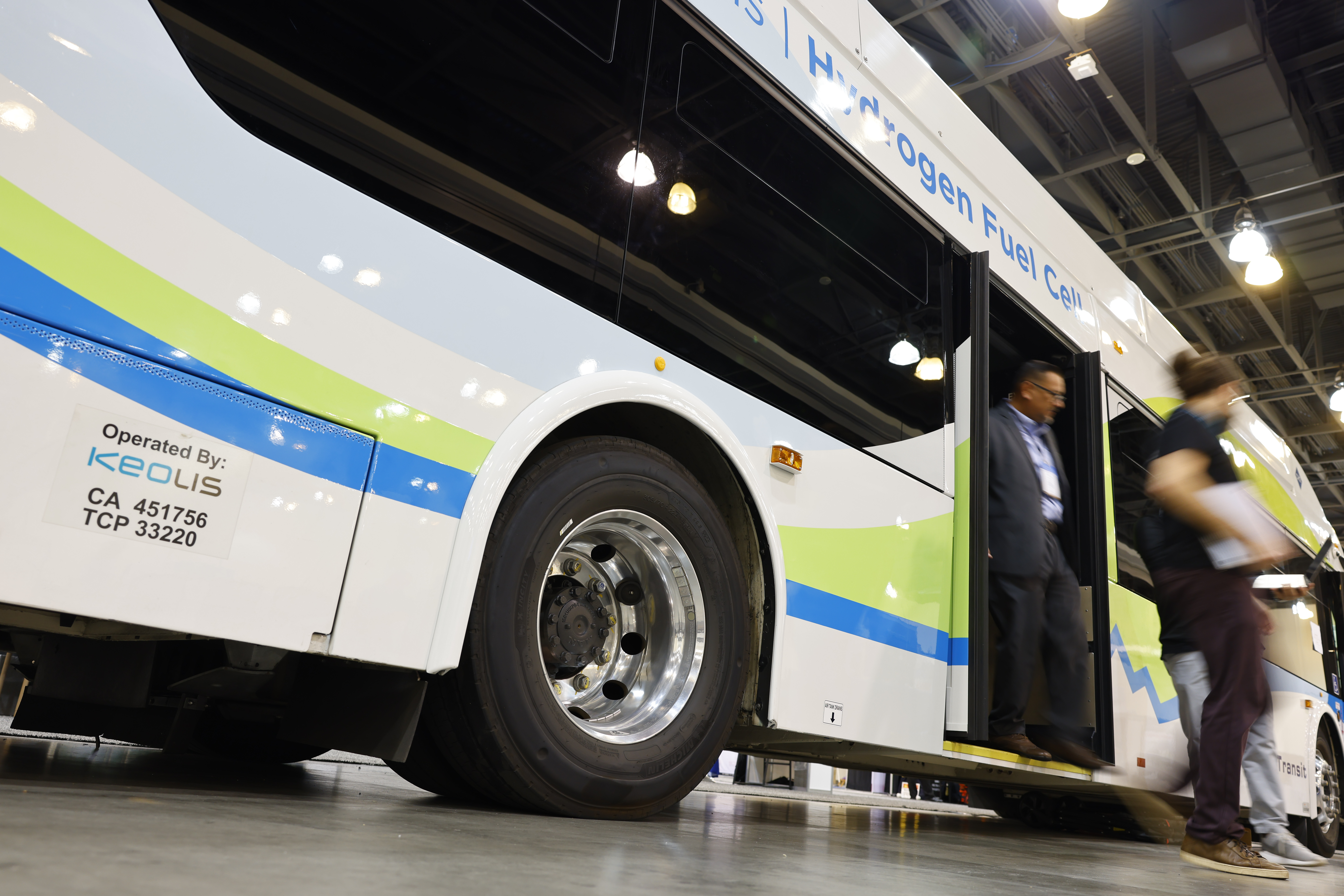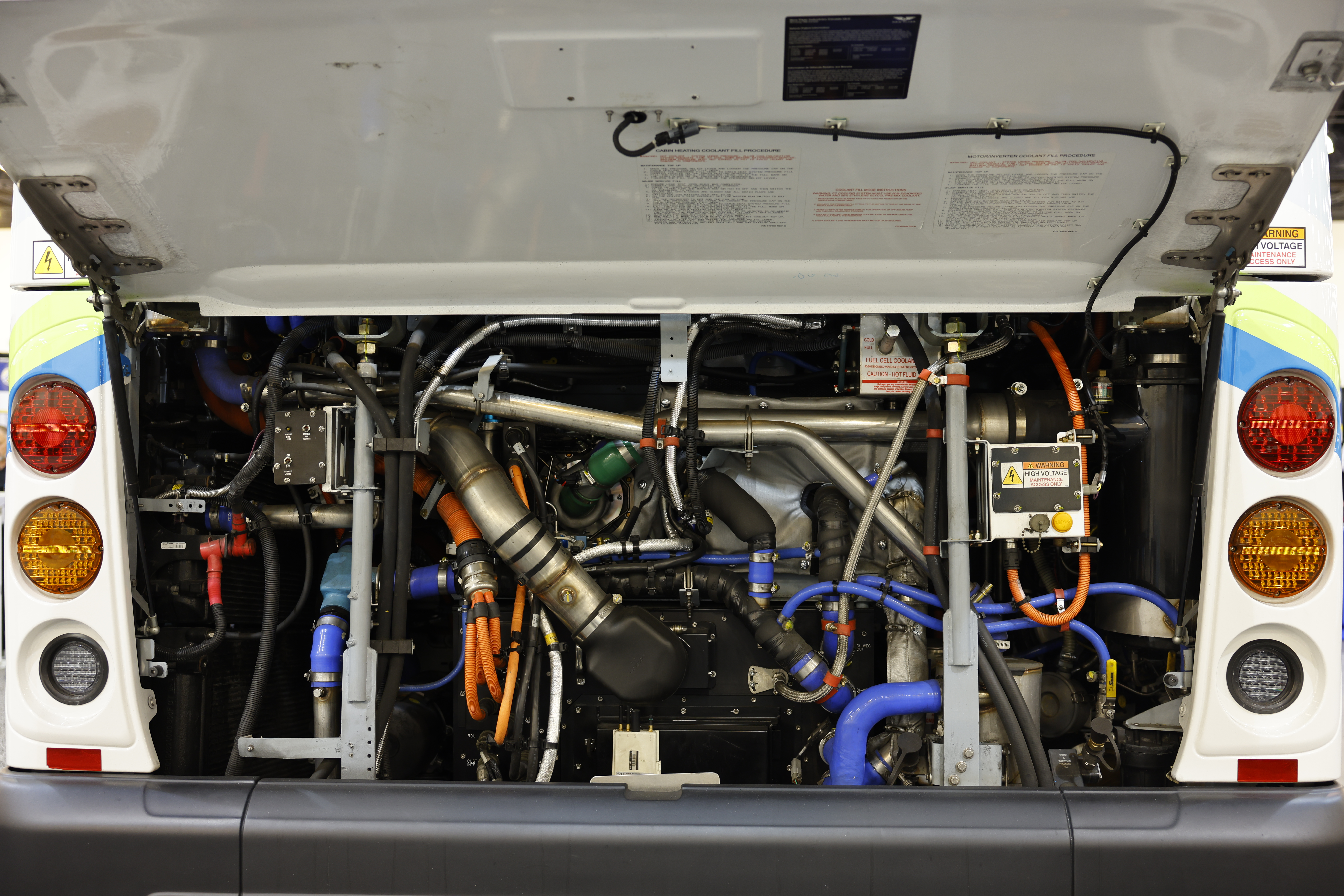With up to $1.2 billion in federal funds coming for difficult-to-decarbonize sectors, transit agencies look to meet climate goals with expanded fleets and infrastructure.
By Arianna Smith
Managing Editor
Transit California
There’s good news for California transit agencies who are looking to meet state climate goals with hydrogen fuel: In October 2023, the Biden-Harris Administration selected California as one of seven regional Clean Hydrogen Hubs (H2Hubs) to share $7 billion in funding from the Bipartisan Infrastructure Law. 
The other six regions designated as Clean Hydrogen Hubs are the Appalachian (West Virginia, Ohio, Pennsylvania), the Gulf Coast (Texas), the Heartland (Minnesota, North Dakota and South Dakota), the Mid-Atlantic (Pennsylvania, Delaware and New Jersey), the Midwest (Illinois, Indiana and Michigan), and the Pacific Northwest (Washington, Oregon and Montana).
According to a statement from the White House, “[T]he hubs aim to produce more than three million metric tons of clean hydrogen per year, thereby achieving nearly one third of the 2030 U.S. clean hydrogen production goal. Together, the seven Hydrogen Hubs will eliminate 25 million metric tons of carbon dioxide emissions from end uses each year—an amount roughly equivalent to combined annual emissions of over 5.5 million gasoline-powered cars.”
The White House goes on to explain additional economic benefits: “The seven selected regional clean hydrogen hubs will catalyze more than $40 billion in private investment and create tens of thousands of good-paying jobs – bringing the total public and private investment in hydrogen hubs to nearly $50 billion.”
California’s New Hydrogen Hub
California was selected following the application submitted by California’s Alliance of Renewable Clean Hydrogen Energy Systems (ARCHES), a public-private partnership between state and local government agencies and energy industry entities. The U.S. Department of Energy will give the state up to $1.2 billion to develop and deploy clean renewable hydrogen, with the overall goals of reducing greenhouse gas emissions, lowering transit fuel costs, and expanding the economy for clean hydrogen. 
“[W]e are moving from concept to reality – advancing clean, renewable hydrogen in California which is essential to meeting our climate goals,” said Governor Gavin Newsom of the funding. “California’s Hydrogen Hub will cut pollution, power our clean energy economy and create hundreds of thousands of good paying jobs.”
California committed to producing hydrogen exclusively from renewable energy and biomass, and the federal funding the state receives will be applied to projects that decarbonize public transportation, heavy duty trucking, and port operations. Governor Newsom’s Administration estimates that the hub will cut up to 2 million metric tons of carbon emissions every year, helping slow climate change and improving Californians’ health outcomes. The Newsom Administration also estimates that the hub will provide $2.95 billion per year in economic value from better health and health cost savings.
Project Labor Agreements are required for all of California’s hub projects. The White House estimates that the California Hub will result in 130,000 construction jobs and 90,000 permanent jobs.
“We’re thrilled the federal government is investing in a once-in-a-generation effort to build hundreds of brand-new hydrogen-powered projects in California that will create thousands of new, high-paying jobs for union contractors and IBEW brothers and sisters,” said Jim Willson, Executive Director, Los Angeles County Chapter NECA and Joel Barton, Business Manager, IBEW Local Union 11 in a joint statement. “We’re ready to train the next generation of green energy workers and look forward to partnering with ARCHES to build the infrastructure that will drive our clean future.”
How is the state investing in hydrogen now, and what’s next?
Toks Omishakin, Secretary of the California State Transportation Agency, summed up the state’s longtime leadership on decarbonization, stating, “California is leading the clean transportation revolution, but we can’t do it alone. With this key federal investment in the ARCHES hydrogen hub, California will establish a nation-leading hydrogen economy that will, amongst many other benefits, help us electrify and diversify our fleets and make hydrogen-powered vehicles a reliable and affordable option for Californians.”
Many California transit agencies are already investing in hydrogen operations, including fuel storage and conveyance, refueling centers, fleet vehicles, and operator training. While some agencies are making plans to go “all-in” on hydrogen, others are pursuing a combination of hydrogen fueled vehicles and other power sources. Transit California previously explored the challenges and opportunities that the state’s transit agencies are considering as they introduce hydrogen fuel vehicles and associated infrastructure into their fleets in the July 2023 article, “Hydrogen fueled fleets help California meet climate goals.”
“Hydrogen is a critical fuel source for California transit agencies to meet the state’s ambitious climate action goals of carbon neutrality by 2045 and a 48% reduction of greenhouse gasses by 2030,” said Michael Pimentel, Executive Director of the Association, following the announcement that California had been selected as a regional hub. “Already, dozens of bus agencies across the state are investing in hydrogen buses and fueling stations to decarbonize their fleets. As technology progresses, rail and ferry agencies will follow, ensuring we can eliminate tailpipe emissions across all modes.”
The question of what happens now that California has been selected as a hydrogen hub was explored during a special plenary session at the Association’s 58th Annual Conference & Expo in November 2023 entitled “ARCHES: What Does it Mean for Transit?” Jaimie Levin, Senior Program Manager and Director of the West Coast Office, Center for Transportation and the Environment, described ARCHES’ commitment to building out the capacity of the hydrogen fuel supply and on bringing down the cost of hydrogen per kilogram, which will expand opportunities for transit agencies to transition to hydrogen, or expand their existing operations.
All seven selected hubs, including California’s, are covered under the federal Justice40 Initiative, with a stated goal of 40 percent of overall benefits of certain federal investments reaching defined disadvantaged communities - those overburdened by pollution, and those that are marginalized or underserved. The hubs are required to develop Community Benefit Plans “to ensure local priorities are at the forefront and all communities share in the benefits of the clean energy transition,” according to the White House.
As part of this requirement, in November 2023, one month after California’s designation as a Clean Hydrogen Hub, ARCHES released its Community Benefits Pathway document to guide the hub’s activities. The document states unequivocally: “Recognizing past inequities and the ongoing harms that fossil fuels have inflicted upon many of our communities, ARCHES is committed to ensuring a just and equitable transition to renewable hydrogen energy in California. That requires maximizing the benefits to those in our disadvantaged communities (DACs), especially in and around ARCHES project sites.”
According to the Community Benefits Pathway document, transit agencies specifically will be able to benefit from a special workforce development “FCEB University” to be planned and developed by AC Transit, which will include training curriculum, as well as “ lessons learned across the more mature projects, which will be replicated throughout the ecosystem to provide training for others” related to workforce supply and training.
Joy Langford, ARCHES Chief Community Officer, emphasized, “ARCHES’ Community Benefits Pathways document is a testament to our commitment to inclusivity and community engagement. It seeks to understand and respond to the unique needs of each community. This initiative embodies a true partnership between industry, labor, academic institutions, government agencies and the people of California.”
Where to keep updated on the California Hydrogen Hub development
Although California has earned its designation as a Clean Hydrogen Hub, the state has a long way to go to start and complete projects to meet its numerous ambitious hydrogen goals. Interested parties can keep up-to-date on ARCHES’ Latest News here. And as always, the Association’s weekly Executive Director’s Report will continue to provide timely information about how the successful ARCHES application is bringing federal funds into California.
Association Executive Director Michael Pimentel concluded, “ARCHES will continue to build momentum behind further adoption of hydrogen technologies across the transportation sector and we are excited to work with ARCHES toward that future.”